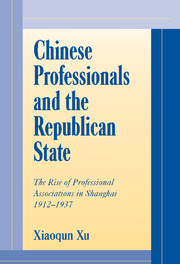 Chinese Professionals and the Republican State
Chinese Professionals and the Republican State Published online by Cambridge University Press: 07 September 2009
The story of Chinese professions and professional associations in Republican China cannot be adequately told without first examining the crucial role of the state. Historically, the Chinese state was always suspicious of voluntary associations, both elite and nonelite varieties, seeing them as representing private interests and subversive to both the state authority and the general harmony of the society. Yet voluntary associations were always part of the Chinese social landscape throughout the ages. They thrived when the political order broke down and maintained a tenuous, often surreptitious existence when the political order was stable. In the late imperial period, rural and urban elite associations gained increasing prominence and legitimacy. From the late nineteenth century onward many societal organizations began to take on a new character. The quickened pace of modernization in the Republican era brought forth more diverse social interests and public issues than ever before and gave rise to new forms of societal organizations and collective actions that sought to address the diverse interests and issues. Many of the issues were articulated and the interests defended in the public arena for the first time, which involved constant interaction between the state and society as well as among social groups.
To save this book to your Kindle, first ensure no-reply@cambridge.org is added to your Approved Personal Document E-mail List under your Personal Document Settings on the Manage Your Content and Devices page of your Amazon account. Then enter the ‘name’ part of your Kindle email address below. Find out more about saving to your Kindle.
Note you can select to save to either the @free.kindle.com or @kindle.com variations. ‘@free.kindle.com’ emails are free but can only be saved to your device when it is connected to wi-fi. ‘@kindle.com’ emails can be delivered even when you are not connected to wi-fi, but note that service fees apply.
Find out more about the Kindle Personal Document Service.
To save content items to your account, please confirm that you agree to abide by our usage policies. If this is the first time you use this feature, you will be asked to authorise Cambridge Core to connect with your account. Find out more about saving content to Dropbox.
To save content items to your account, please confirm that you agree to abide by our usage policies. If this is the first time you use this feature, you will be asked to authorise Cambridge Core to connect with your account. Find out more about saving content to Google Drive.